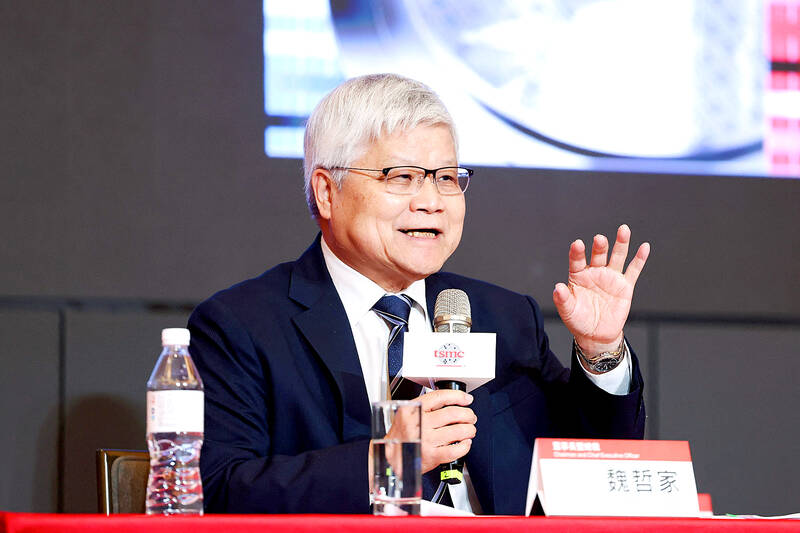Taiwan Semiconductor Manufacturing Co (TSMC, 台積電) yesterday reiterated that the company has not entered discussions with any company about potential investments or partnerships amid ongoing rumors of ailing Intel Corp seeking TSMC’s participation.
In a statement, TSMC, the world’s largest contract chipmaker, dismissed a report by the Wall Street Journal, saying that Intel had approached TSMC soliciting investment in Intel’s manufacturing operations or a partnership.
The company said it has never entered into talks with any company on establishing a joint venture or engaging in the licensing or transfer of technology.

Photo: I-Hwa Cheng, AFP
That stance was similar to previous statements made by TSMC chairman C.C. Wei (魏哲家) on several occasions when asked about a potential partnership with Intel.
Rumors about TSMC’s possible acquisition of a stake in Intel have been circulating for months.
After the Wall Street Journal report surfaced, TSMC’s American depositary receipts (ADRs) fell 1.44 percent overnight in the US, caused by fears that the Taiwanese chipmaker could lose the trust of its clients and see a fall in orders if it were to work with Intel, analysts said.
TSMC’s investments in Intel could help the US company improve its technology, which would create a stronger competitor for TSMC, while a partnership could result in technology leaks from the Taiwan side, analysts said.
Intel, which has been unable to keep up with TSMC on semiconductor manufacturing technologies, has secured investment from the US government, Japan’s Softbank Group and California-headquartered Nvidia Corp to support Intel CEO Lip-Bu Tan’s (陳立武) bid to turn around the ailing chipmaker.
After the US government took a 10 percent stake in Intel, the US chipmaker last month received US$2 billion in investment from Softbank and then a US$5 billion pledge last week from Nvidia.

NEW IDENTITY: Known for its software, India has expanded into hardware, with its semiconductor industry growing from US$38bn in 2023 to US$45bn to US$50bn India on Saturday inaugurated its first semiconductor assembly and test facility, a milestone in the government’s push to reduce dependence on foreign chipmakers and stake a claim in a sector dominated by China. Indian Prime Minister Narendra Modi opened US firm Micron Technology Inc’s semiconductor assembly, test and packaging unit in his home state of Gujarat, hailing the “dawn of a new era” for India’s technology ambitions. “When young Indians look back in the future, they will see this decade as the turning point in our tech future,” Modi told the event, which was broadcast on his YouTube channel. The plant would convert

‘SEISMIC SHIFT’: The researcher forecast there would be about 1.1 billion mobile shipments this year, down from 1.26 billion the prior year and erasing years of gains The global smartphone market is expected to contract 12.9 percent this year due to the unprecedented memorychip shortage, marking “a crisis like no other,” researcher International Data Corp (IDC) said. The new forecast, a dramatic revision down from earlier estimates, gives the latest accounting of the ongoing memory crunch that is affecting every corner of the electronics industry. The demand for advanced memory to power artificial intelligence (AI) tasks has drained global supply until well into next year and jeopardizes the business model of many smartphone makers. IDC forecast about 1.1 billion mobile shipments this year, down from 1.26 billion the prior

People stand in a Pokemon store in Tokyo on Thursday. One of the world highest-grossing franchises is celebrated its 30th anniversary yesterday.

Zimbabwe’s ban on raw lithium exports is forcing Chinese miners to rethink their strategy, speeding up plans to process the metal locally instead of shipping it to China’s vast rechargeable battery industry. The country is Africa’s largest lithium producer and has one of the world’s largest reserves, according to the US Geological Survey (USGS). Zimbabwe already banned the export of lithium ore in 2022 and last year announced it would halt exports of lithium concentrates from January next year. However, on Wednesday it imposed the ban with immediate effect, leaving unclear what the lithium mining sector would do in the